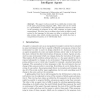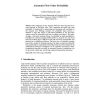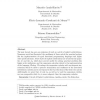169 search results - page 16 / 34 » Which Languages Have 4-Round Zero-Knowledge Proofs |
AMAST
2006
Springer
13 years 11 months ago
2006
Springer
This paper revolves around the so-called plan revision rules of the agent programming language 3APL. These rules can be viewed as a generalization of procedures. This generalizatio...
SEMWEB
2009
Springer
14 years 2 months ago
2009
Springer
Most languages for the Semantic Web have their logical basis in some fragment of first-order logic. Thus, integrating first-order logic with probability is fundamental for represen...
CADE
2005
Springer
14 years 7 months ago
2005
Springer
In today's society, people have very little control over what kinds of personal data are collected and stored by various agencies in both the private and public sectors. We de...
IANDC
2010
13 years 4 months ago
2010
There is an increasing interest in the shuffle product on formal languages, mainly because it is a standard tool for modeling process algebras. It still remains a mysterious opera...
ENTCS
2002
13 years 7 months ago
2002
The past decade has seen an explosion of work on calculi of explicit substitutions. Numerous work has illustrated the usefulness of these calculi for practical notions like the im...



